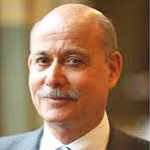Global economies and the Internet are two upcoming topics in the Washington University in St. Louis Assembly Series.
Economic forecaster and social observer Jeremy Rifkin will deliver a talk titled “The Third Industrial Revolution: How Lateral Power is Transforming Energy, the Economy and the World” at 2 p.m. Monday, Feb. 27, in Graham Chapel.
Later in the week, James Boyle, JD, the William Neal Reynolds Professor of Law
at Duke Law School, will discuss “Cultural Agoraphobia: Why Most
of What You Know About the Internet is Wrong” at 5 p.m. Wednesday, Feb.
29, in the Anheuser-Busch Hall Bryan Cave Moot Courtroom.
Rifkin
According to Rifkin, the world witnessed the end of the modern era in July 2008, when geopolitical and socioeconomic forces sent the cost of oil soaring to $147 a barrel. Eighteen months later, there was a worldwide financial collapse.

How the world got to this critical point — and how to take advantage of the opportunities on the horizon — are the basic themes in Rifkin’s latest book by the same title: The Third Industrial Revolution: How Lateral Power Is Transforming Energy, the Economy and the World.
His talk also serves as the annual Elliot Stein Lecture in Ethics.
Rifkin is the visionary president of the Foundation on Economic Trends, a consultant to the European Union, and the author of 19 books that have explored the impact of scientific and technological changes on the economy, the workforce, society and the environment.
He has searched the historical record and found parallels between the changing forces today and past circumstances that created monumental shifts — eras now identified as the first and second industrial revolutions.
Among his bestselling books are The Empathic Civilization, The Hydrogen Economy, The European Dream, The End of Work, The Age of Access and The Biotech Century.
For the past decade, Rifkin has served as adviser to the European Union (EU) on issues related to the economy, climate change and energy security. In addition, he advises the European Commission, the European Parliament and several EU heads of state.
Rifkin graduated from the University of Pennsylvania’s Wharton Business School with a degree in economics, and, since 1994, has been a senior lecturer for Wharton’s executive education program. He also holds a degree in international affairs from Tufts University.
In addition to his books, Rifkin is a frequent contributor to leading newspapers, and his monthly column on global issues appears in many of the world’s leading newspapers and magazines.
Boyle
Boyle’s lecture is the first of three talks he will deliver on the WUSTL campus for the Interdisciplinary Project in the Humanities Lecture Series.

On Jan. 18, Congress received a strong warning from online information providers that going forward with two pending anti-piracy bills will severely limit the Internet’s open, dynamic environment. (That same day, the bills’ sponsors began backing down.)
This is the latest salvo in the ongoing legal war that pits protection of intellectual property against the desire for unfettered access.
One of the leading scholars on the side of open access is Boyle, whose research shows that ever-tightening restrictions on reasonable access is preventing the world’s collection of intellectual and artistic concepts from entering the public domain, to the detriment of society.
Boyle is the author of numerous publications, including Shamans, Software and Spleens: Law and Construction of the Information Society and The Shakespeare Chronicles, a novel about the search for the true author of Shakespeare’s works.
His latest book, The Public Domain: Enclosing the Commons of the Mind, was named the 2009 Book of the Year by the American Society for Information Science and Technology.
He is a co-founder of the Center for the Study of the Public Domain at Duke. He was one of the original board members of Creative Commons, which develops, supports and stewards legal and technical infrastructure that maximizes digital creativity, sharing and information.
Boyle graduated from the University of Glasgow and earned his law degree from Harvard University.
Boyle’s second and third presentations for the Interdisciplinary Project in the Humanities (IPH) Lecture Series are scheduled for March 1 and 2.
“The Internet Threat: The Farmer’s Tale and Other Myths of Intellectual Property” is set for 5 p.m. Thursday, March 1; and “Seven Ways to Ruin a Technological Revolution (And Why We Shouldn’t)” is set for 5 p.m. Friday, March 2. Both talks will take place in the Women’s Building Formal Lounge.
For more information on the IPH lecture series, call (314) 935-4200.
For more information on upcoming events and other Assembly Series programs, visit assemblyseries.wustl.edu or call (314) 935-4620.